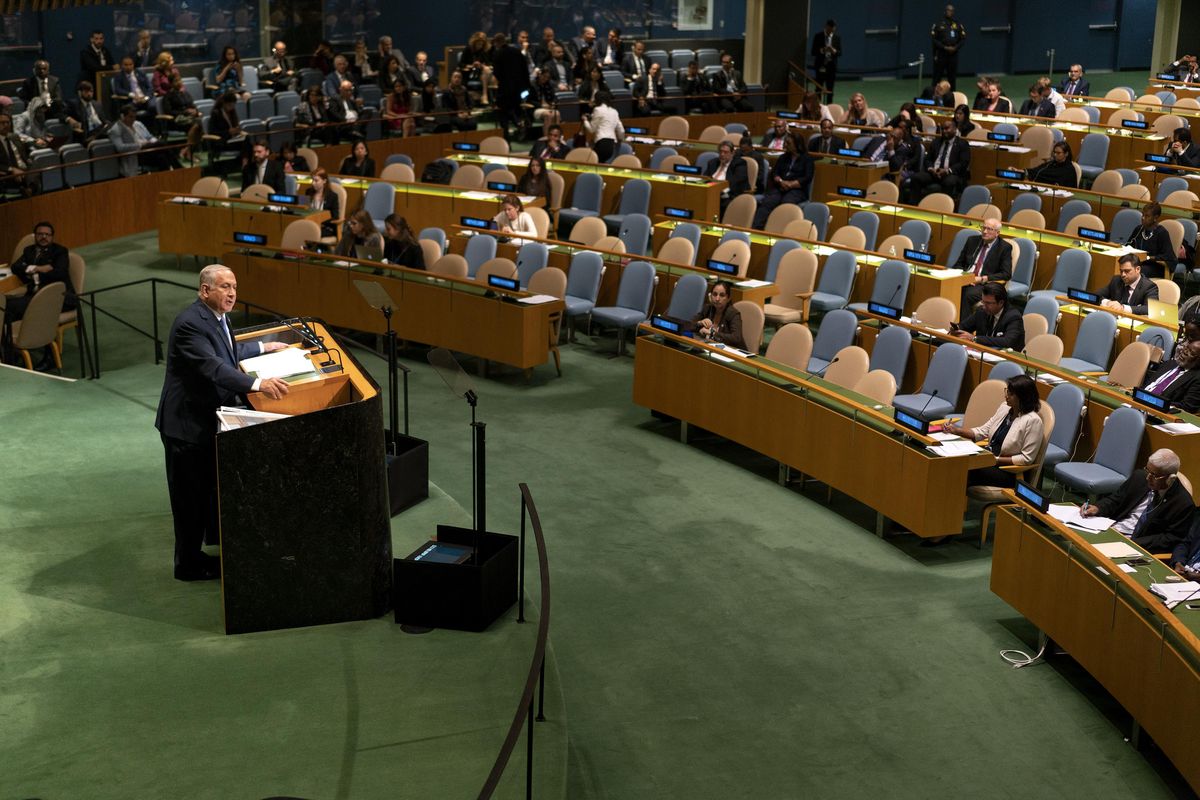Israel vs Iran: Netanyahu lobs nuclear claim – again

UNITED NATIONS – Clandestine nuclear dumping. Concealing atomic material near a rug-cleaning plant. Lying to international partners.
Accusing Iran of all of the above, Israeli President Benjamin Netanyahu fired a new salvo Thursday in his campaign to prove that Tehran can’t be trusted and poses a massive threat to international security.
In response, Iran shrugged.
Netanyahu’s presentation at the U.N. General Assembly – brandishing props and exhibiting his trademark showmanship – marked the latest in a run of revelations or accusations about Iran’s nuclear program, as he ratchets up his campaign against the 2015 global accord that’s meant to stop Iran from obtaining nuclear weapons.
He challenged U.N. nuclear inspectors to examine a new “secret atomic warehouse” near Tehran – but it’s unclear whether the announcement sheds new light on what inspectors already knew, or proves that Iran is violating the 2015 deal.
The warehouse announcement showcased Netanyahu’s unyielding views on Iran and anger at Europeans he accuses of appeasing Israel’s enemies.
Showing a map and photo of the site on oversize boards, he said Iran concealed “massive amounts of equipment and material” in a facility near a rug-cleaning plant in the Turquzabad district. He said Iranian officials cleared out some radioactive material in recent weeks and secretly released it around Tehran.
“You have to ask yourself a question: Why did Iran keep a secret atomic archive and a secret atomic warehouse?” he asked. “What Iran hides, Israel will find.”
He said Israel shared the information with the United Nations’ atomic watchdog, the Vienna-based International Atomic Energy Agency, and urged the IAEA to inspect the site. He suggested the agency wasn’t doing enough to press Iran on Israeli revelations, appearing to cast doubts on the agency’s credibility.
The IAEA had no immediate comment.
Iranian state television called the announcement “ridiculous,” and Iran’s state-run IRNA news agency reported Netanyahu’s remarks with barely disguised disdain, saying he “annually launches a ridiculous show at the U.N. General Assembly.”
Iranian President Hassan Rouhani defended the 2015 deal at the United Nations earlier this week, and upon return home Thursday, he said most other countries either directly or indirectly backed the accord, reached by Iran, the United States and five other major powers.
Netanyahu made a similarly splashy accusation in May, saying Israeli agents spirited away a “half ton” of documents regarding Iran’s nuclear program from a facility in Tehran’s Shourabad neighborhood. Iran hasn’t acknowledged the alleged seizure.
President Donald Trump cited that announcement when he withdrew the United States from the nuclear accord soon afterward.
Netanyahu did not say what the material was, and it was unclear whether his presentation provided any evidence that Iran had violated the 2015 nuclear deal.
That agreement came after years of Western sanctions over the country’s contested atomic program. The deal saw Iran drastically limit its enrichment of uranium in exchange for the lifting of crushing economic sanctions.
Iran long has denied seeking atomic weapons.
In the 1990s, Iran expanded its nuclear program and “may have received design information” for a bomb and researched explosive detonators, according to the IAEA. By 2002, Western intelligence services and an Iranian opposition group revealed a covert nuclear site at the central city of Natanz. The IAEA has said there was “no credible” evidence of Iran seeking a nuclear explosive device after 2009.
Israel, which considers Iran to be its biggest threat, has sought repeatedly to undercut the 2015 nuclear deal despite the United Nations repeatedly confirming Iran abides by its terms.
Since Trump’s decision to withdraw from the accord, Iran’s already-anemic economic has seen a drastic devaluation of its rial currency. While the rial traded at some 62,000 to one U.S. dollar in May, it traded Thursday at some 177,000 to $1.
Netanyahu urged European signatories to join Trump in abandoning the deal and halting trade with Iran.
“Does anyone seriously believe that flooding Iran’s theocracy with weapons and cash will curb its appetite for aggression?” Netanyahu asked.
“Europeans and others are appeasing Iran by trying to help it bypass” new U.S. sanctions, he said. “Have these European leaders learned nothing from history? Will they ever wake up?”
It was a reference to British Prime Minister Neville Chamberlain’s agreement handing Hitler the Sudetenland ahead of World War II, a move seen as Europe appeasing the Nazis at Jews’ expense.
Netanyahu also showed images Thursday of what he said are rocket factories run by Iranian-backed militia Hezbollah hidden in civilian areas in Lebanon’s capital.
Netanyahu is known for its showmanship at the U.N. General Assembly. In 2012, he famously held up a poster board of a cartoon bomb while discussing Iran’s nuclear program.